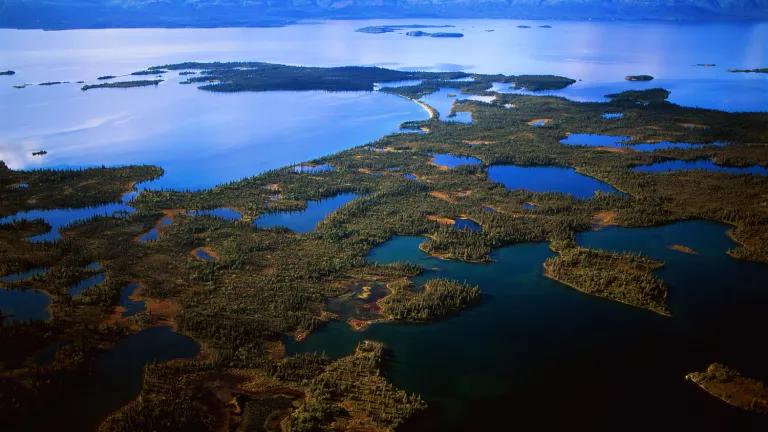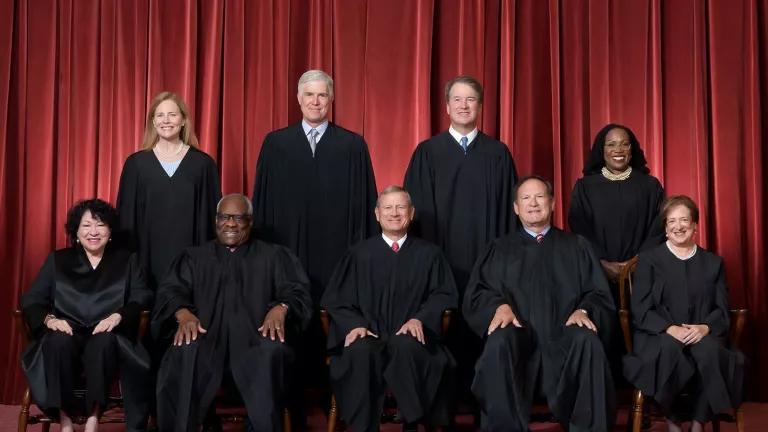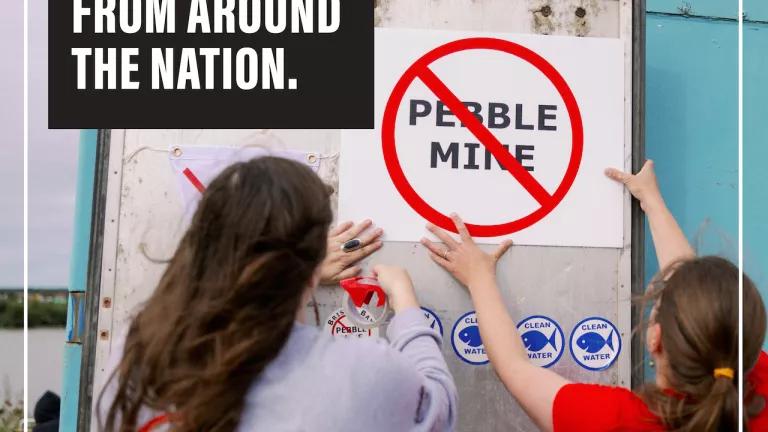Celebrate Ocean Month by Protecting Bristol Bay
As fishing season begins in Bristol Bay, local leaders call on EPA and Congress to permanently protect the region.

As fishing season begins in Bristol Bay, local leaders call on EPA and Congress to permanently protect the region
June 2021 is National Ocean Month! President Biden proclaimed it to “celebrate our stewardship of the ocean and coasts, and reaffirm our commitment to protecting and sustaining them for current and future generations.” Protecting Bristol Bay, Alaska from the toxic Pebble Mine is an easy step towards fulfilling this goal and ensuring a vital national resource and indigenous way of life is safeguarded for generations to come.
Bristol Bay is the most valuable wild salmon fishery in the world. It generates $2.2 billion in annual economic output, supports 15,000 jobs, and supplies almost 60% of the world’s sockeye salmon. Bristol Bay salmon is also the lifeblood of the region’s indigenous peoples who have depended on salmon for cultural and physical nourishment for thousands of years.
Yet as the fishing season begins in Bristol Bay (wild salmon are already starting to return!), the threat of the Pebble Mine still looms large.
If built, the Pebble Mine would transform an entire region and a way of life due to its location, size, and impacts. Scientific and technical experts, including the Environmental Protection Agency (EPA) and Army Corps of Engineers (Corps), have confirmed the significant and unavoidable risks that the Pebble Mine—or any large-scale mine—would pose to the natural resources of the Bristol Bay region and to the communities and wildlife that they sustain. The Pebble Mine would destroy thousands of acres of wetlands and hundreds of miles of streams at the headwaters of the world’s greatest wild salmon fishery.
Although the Corps denied Pebble’s key federal permit in November 2020, the project and its 100 percent owner Northern Dynasty Minerals continue to threaten the Bristol Bay region. The company has appealed the denial and is committed to fight on no matter the outcome. And it could always modify or refile its permit application at any time (months or even years from now). Dozens of mining claims are staked in the region, hanging over Bristol Bay communities like a sword of Damocles.
The permit denial offers no lasting protection or long-term security. It is a temporary reprieve, not a permanent solution.
The people of the region want a permanent solution, and they have one in mind: They are calling on (1) EPA to veto the Pebble Mine using its authority under Section 404(c) of the Clean Water Act, and (2) Congress to pass legislation that permanently protects Bristol Bay.
At a press conference yesterday, the Tribal, fishing, and business leaders of Bristol Bay* outlined their unified regional vision for EPA and Congressional action, the breadth of support for this dual track approach, and the urgency to act now.
United Tribes of Bristol Bay Executive Director Alannah Hurley, speaking on behalf of the “people who live here, people who work here [and] people who raise our families here” noted that the “region will not rest until we secure permanent protection.” She called on the Biden administration to “move from campaign promises to action” and urged EPA to initiate 404(c) action “by the end of this fishing season,” which would “set the foundation” for further legislative action.
“The region is united,” said Bristol Bay Economic Development Corporation Chairman Robin Samuelsen. “We must protect Bristol Bay at all costs,” and the first step is through 404(c) action. After reminiscing about President Obama’s impactful trip to Bristol Bay, he implored the Biden administration: “Show me action as the President of the United States…that you’re going to protect Bristol Bay…for our future generations.”
This overwhelming consensus from the Bristol Bay region reflects widespread recognition of the substantial negative impacts that the Pebble Mine would have on the region’s environment, economy, and way of life.
For the Yup’ik, Dena’ina, and Alutiiq indigenous communities in Bristol Bay, it is a fight to save their traditional way of life and food supply.
For commercial fishermen and business owners in the region, it is a fight to save their livelihoods.
Senator Lisa Murkowski recently traveled to Bristol Bay to meet with Tribal, community and business stakeholders. The topic of discussion was permanent protections for Bristol Bay through both Congressional legislation and administrative action.
President Biden’s National Ocean Month proclamation recognized just how important ocean resources are to a thriving, sustainable economy:
“Investing in our fishing communities and supporting local seafood supply options will also be critical to helping us build a climate-resilient, sustainable ocean economy… By protecting our ocean and coastal ecosystems and resources, we are also protecting the worldwide economies and people that depend on them.”
The Biden administration can live up to its promises right now by protecting Bristol Bay.
Bristol Bay supports an essential, sustainable ocean economy that generates $2.2 billion in annual revenue and 15,000 jobs. Unlike other fish stocks that are declining around the world, Bristol Bay salmon remain abundant.
During the press conference, Bristol Bay Regional Seafood Development Association Vice President Fritz Johnson described Bristol Bay as the last wild salmon stronghold on the planet, noting the abundance and sustainability of its salmon runs. According to the BBRSDA: “[T]his year’s Bristol Bay sockeye forecast is the third-largest ever and the biggest since 1995. Simply put, the world’s most prolific salmon producing region has never been more abundant than it has been in recent years.”
Salmon have also sustained the lives, livelihoods, and culture of Bristol Bay’s indigenous communities for millennia.
Permanently protecting Bristol Bay through a 404(c) veto of the Pebble Mine would advance not only the goal of ocean protection but would also provide a unique opportunity for the Biden administration to simultaneously advance its environmental, social justice, and sustainable jobs agendas.
Stand with the people of Bristol Bay and urge the Biden administration to act now.
* Bristol Bay Native Corporation (BBNC), Bristol Bay Native Association (BBNA), United Tribes of Bristol Bay (UTBB), Bristol Bay Economic Development Corporation (BBEDC), Bristol Bay Regional Seafood Development Association (BBRSDA), and Commercial Fishermen for Bristol Bay (CFBB) represent the cultural heartbeat and economic livelihood of Bristol Bay. BBNC is a responsible Alaska Native investment corporation representing more than 10,000 Native shareholders and the largest private landowner in the region; BBNA is Bristol Bay’s regional nonprofit tribal consortium representing 31 Bristol Bay Tribes; UTBB is a tribal consortium representing 15 Bristol Bay tribal governments that represent more than 80 percent of the region’s total population; BBEDC represents 17 communities promoting economic growth and opportunities for Bristol Bay residents; BBRSDA is a trade group representing over 8,000 commercial Bristol Bay salmon fishermen who hail from Alaska and 47 other U.S. states; and CFBB is a national coalition of fishermen working to protect Bristol Bay, Alaska.




